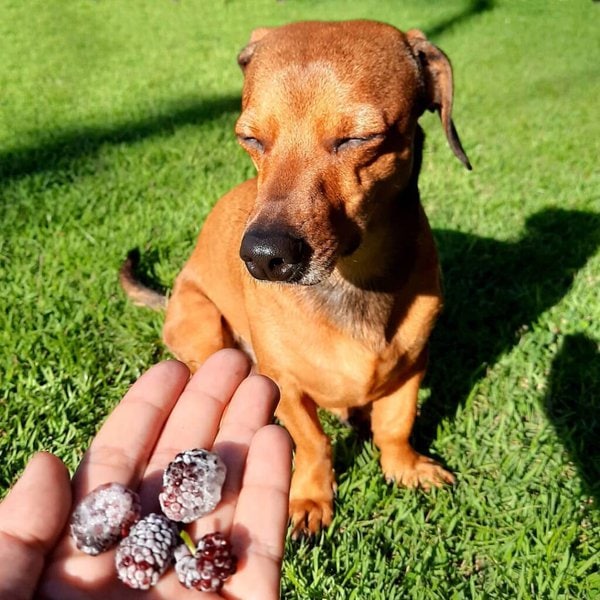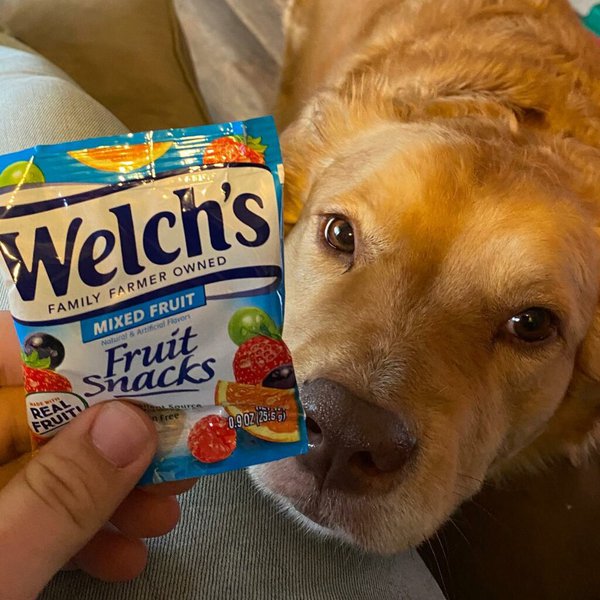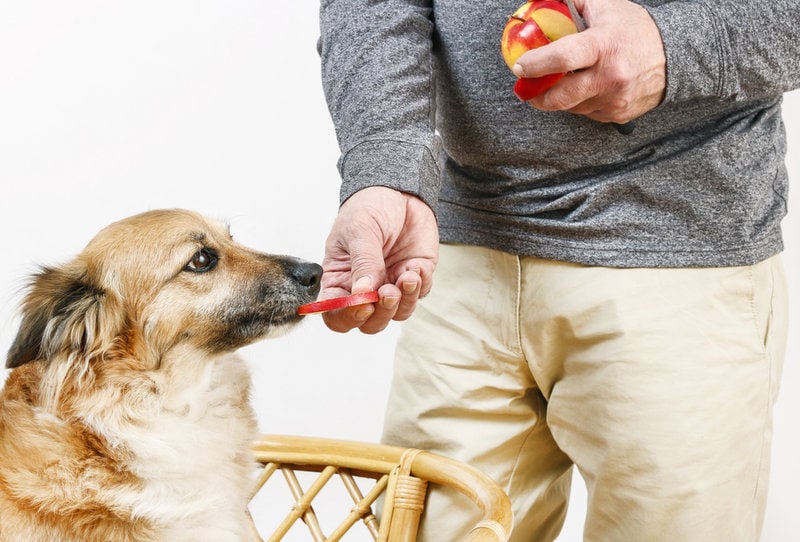We love our furry friends and only want the best for them. This includes the types of snacks we give them. A common concern of pet owners is whether dogs can eat fruit snacks; in some cases, it can be bad for them. Dog digestive tracts are sensitive, and any wrong snack can send them to the vet.
Fruit snacks are mostly not good for your pup’s digestive health, whether they are Welch’s Fruit Snacks or any other brands on the market. It is because they contain additives and processed sugar which, if taken in large amounts, can lead to digestive problems like diarrhea, bloating, and overall discomfort.
How far can you push the limit with fruit snacks? Which healthier alternatives can your doggie enjoy? This is a comprehensive guide to help you make the best decision for your furry buddy.
Can Dogs Eat Fruit Snacks?

Yes, dogs can eat fruit snacks but only in extreme moderation. Firstly, ensure that the fruit snacks you give your dog are, indeed, made for dogs. You can choose the best options for your pup by reading up on its ingredient list.
Remember your dog’s special dietary needs before giving your dog fruit snacks. You can find out if there is anything your pup is allergic to by visiting your vet. Make sure the snacks are given as a treat and not a meal.
If you want to give your pup fruit snacks, you can also contact a manufacturing company like Welch’s Fruit Snacks to find out more about their products before buying. Once again, extreme moderation is important.
What Are Fruit Snacks?
Fruit snacks resemble gummy candy made of sugar and fruit extracts. Fruit snacks are also made of different dried fruits and are an alternative to old-school candy. There are snacks for humans and dogs, but we will focus on the latter.
In moderation, the right type of fruit snacks can help increase vitamin intake and improve the immune system. I recommend choosing fruit snacks with natural ingredients that do not contain allergens or refined sugar.
What Are The Dangers Of Dogs Eating Fruit Snacks?

Gastrointestinal Problems
Too many fruit snacks can give dogs an upset tummy, which can lead to bouts of diarrhea. This means that they will feel bloated and uncomfortable. Never use fruit snacks as a substitute for regular dog food.
Dental Issues
Just like humans, the sugar and additives in fruit snacks can cause cavities, plaque, and tartar buildup on your pup’s teeth. Always keep this in mind before handing fruit snacks to dogs.
Carcinogens
Some fruit snacks also contain food coloring that may contain carcinogens. Some fruit snacks are okay but only if given as a rare snack in moderation. You can find out from your vet if there are specific fruits that your furry friend is allergic to.
What Snacks Are Not Safe For Dogs?
Chocolates
Chocolate is one of the most dangerous snacks for dogs because it contains methylxanthines. This can slow down or even stop a dog’s body processes. Chocolate can cause diarrhea, vomiting, and in extreme cases, seizures and death.
Grapes And Raisins

Grapes and their dried fruit version, raisins, can be a health hazard to your furry friend. This is because they are toxic to their digestive system and can cause kidney failure and low urine production.
Macadamia Nuts
Nuts generally have high-fat content. Macadamia nuts can cause complications in the pancreas and can lead to pancreatitis. They can also cause nausea, vomiting, depression, and even hyperthermia.
Salty Snacks
When it comes to salty snacks, too much salt for dogs can cause sodium ion poisoning and dehydration. You can give foods and snacks with a small amount of salt, but that is all your doggie needs. If unsure of how much salt to give your pup, reach out to a vet for guidance.
What Are Welch’s Fruit Snacks?
Welch’s Fruit Snacks are chewy fruit snacks that contain fruity flavors and vitamins A, C, and E. They are “gluten-free, fat-free, and preservative-free.” Welch’s Fruit Snacks also contain sugar and other additives that you should consider if you want your pup to eat them. Next, let’s take a closer look at what is in Welch’s Fruit Snacks.
Juice From Concentrates
Welch’s Fruit Snacks contain concentrated juice from grapes, peaches, pears, and pineapples. The concentrated juice comes from excess water squeezed out of the fruit, leaving behind a thick, sweet juice. The challenge with this process is that it can strip fruits of some nutrients.
Sugar And Corn Syrup

Corn syrup is a combination of glucose and fructose. Additionally, Welch’s adds some sugar to their fruit snacks. It is important to note that fruits already have their own sugar, so adding more can be overkill. Remember to eat sugar only in moderation, especially for kids and dogs.
Fruit Puree
Fruit purees contain blended fruits and can also include the peel. The advantage of eating fruit peels is that they help with fiber intake and digestion. Fruit Puree comes in grape, orange, strawberry, and raspberry flavors.
Flavoring Component
Fruit snacks contain both natural and artificial flavors. Artificial flavors are usually created in a lab. They help to give flavor to fruits that have lost their original taste during freezing, dehydrating, or canning.
Modified Corn Starch
Modified corn starch is a variation of regular corn starch often used as a thickener or stabilizer. Modified corn starch dissolves quickly and is not necessarily dangerous. However, it is not always safe for those allergic to gluten, so always check the label.
Other Ingredients
The list can include but is not limited to gelatin, lactic acid, coconut oil, vitamin A, palmitate, vitamin C, vitamin E, ascorbic acid, or carnauba wax and coloring.
What Do Vets Have To Say About Fruit Snacks For Dogs?

Veterinarians do not advise giving dogs fruit snacks. The main reason is that they contain sugar and other ingredients that are not entirely safe for dogs. A dog may eat one once in a while as the owner enjoys their snacks, but that is it.
If your dog eats too many fruit snacks, it should experience indigestion, bloating, diarrhea, and so on. If you notice these symptoms in your pup, take them to the vet as soon as possible.
Should Dogs Eat Welch’s Fruit Snacks?
Dogs should not eat Welch’s Fruit Snacks in excess. Once in a while, your pup may eat one, but it should not be a regular habit. Remain aware of the ingredients in these fruit snacks, such as coloring, sugar, and other additives. These can make your dog sick or uncomfortable.
What Are Other Snacks That Dogs Can Eat?
Dog snacks, regular food, fruits, vegetables, and dog chews are some snacks your dogs can enjoy. Some companies make dog snacks like jerky, tendon, ears, tails, and specific meat cuts. You can also look for doggy chews made for dogs. Healthier options include fruits such as apples, berries, and carrots.
What Fruits Do Dogs Eat?

Blueberries, strawberries, watermelon, oranges, mangoes, pears, and pineapples are a few examples of fruits dogs can eat. It is important to remember that dogs, like humans, are different.
Fruits like berries are rich in fiber, antioxidants, vitamin C, and potassium, which are great for the immune system. Fruits like blueberries also contain phytochemicals known to boost mental health and night vision, as well as prevent cell damage. The only berries that you should not give your pup are wild berries because they are toxic for dogs.
When feeding fruits to your dog, make sure to cut them into small pieces to prevent choking. For small and aging dogs, puree fruit for easier digestion. As always, talk to your veterinarian before feeding anything new to your dog.
What Are Safer Fruit Snack Alternatives?
Of course, there are safe alternatives to fruit snacks, and they happen to be real, unprocessed fruits that you would get from a nearby supermarket or grocery store. Here are some examples you can definitely buy to feed your dog.
Apples
Apples are perfect for helping with your pup’s dental health. They also contain vitamins A and C. Remember to remove seeds from any fruits you give your pet.
Blueberries

Blueberries are rich in antioxidants and help cell repair in dogs and humans. They are also rich in fiber, which helps with digestion and gut health.
Carrots
Carrots contain vitamins and fiber. They also help keep teeth strong and healthy. You should cut fruits into smaller pieces or puree them to prevent choking.
Which Fruits And Vegetables Should Dogs Not Eat?
Asparagus, avocado, cherries, grapes, raisins, wild berries, mushrooms, unripe tomatoes, onions, and garlic are unsafe fruits and vegetables for your furry friends.
Some fruits may not be toxic but can cause health problems, and there are those not advisable to give to your pup.
Avocado
Most parts of an avocado are deemed unsafe for dogs. The skin, pit, and leaves are rich in persin, a toxin that induces vomiting and diarrhea in pups. The flesh of the fruit is also not safe for dogs, although it has less persin.
Cherries
Cherries contain cyanide, which can cause your dog to get extremely sick. They are so dangerous that they can disrupt oxygen in blood cells. Your doggie might experience red gums, breathing difficulties, and dilated pupils.
Unripe Tomatoes

Unripe tomatoes can cause illnesses in dogs because of the toxin known as solanine. This is very specific to unripe tomatoes, as ripe tomatoes are relatively safe for your furry friend.
Asparagus
While asparagus is healthy for you, it can be a problem for dogs. Raw asparagus is too tough for dogs to chew and can cause indigestion. The cooked version kills some of the nutrients, which means they will be of little help to your dog’s health.
Onions
Onions belong to the Allium family and are a no-no for dogs. They can cause vomiting, diarrhea, nausea, and stomach discomfort. In extreme cases, they can cause the rupture of your pup’s red blood cells. The toxin allium causes this.
How Can You Tell If Your Pup Is Allergic To Fruit?
Skin inflammation, ear infection, upset tummy, loss of fur, and discomfort are some ways to tell if your dog is allergic to the fruit. These symptoms can be a sign of other health problems, so never ignore them. A visit to your vet is important whenever your dog experiences any allergic reaction.
The Final Verdict

Dogs, like humans, have different dietary needs. While eating natural foods is ideal, some processed snacks are acceptable. In the case of fruit snacks like Welch’s Fruit Snacks, it is not a good idea to give too many to your furry friend.
One treat is alright, but you should first know if your pup has any allergies you should worry about. Some of the ingredients might be harmful to your pup, so keep this in mind.





